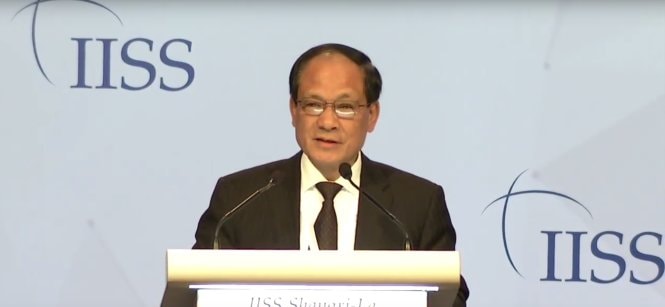ASEAN Secretary General: Competing powers will affect the region
The head of ASEAN warned that if not well managed, competition between major powers in Southeast Asia would seriously affect regional peace and stability.
 |
| ASEAN Secretary General Le Luong Minh speaks at the 4th plenary session of the Shangri-La Dialogue on the morning of June 4 - Screenshot |
With the theme "Seeking a common security foundation for the region", the 4th plenary session at the Shangri-La Dialogue this morning (June 4) had the participation of Indonesian Defense Minister Ryamizard Ryacudu, ASEAN Secretary General Le Luong Minh and Philippine Deputy Minister for Defense Policy Ricardo A David Jr.
Philippine Defense Secretary Delfin Lorenzana canceled his participation at the last minute due to the fighting situation in Marawi City.
South China Sea Disputes Threaten Regional Security
With cultural, religious and political diversity, each ASEAN country has its own security issues. However, over the years, ASEAN has demonstrated consensus and cooperation in non-traditional security areas such as cyber security, piracy, armed robbery, disaster response and humanitarian relief, etc.
Cooperation mechanisms between ASEAN countries and partners were mentioned in Mr. Le Luong Minh's speech.
"Despite ASEAN's efforts to maintain peaceful diplomatic methods and regional stability, traditional and non-traditional security challenges continue to pose risks and threats to the region's growth and prosperity. Tensions in the East Sea, arising from ongoing sovereignty disputes, have negative impacts on regional peace and stability," the ASEAN Secretary-General warned.
The ASEAN leader affirmed: "The importance of the East Sea to countries in and outside the region cannot be underestimated. The freedom of navigation and aviation of each country in the East Sea can only be maintained through a friendly, peaceful and harmonious security environment."
"However, in the past 15 years, since its signing, the Declaration on the Conduct of Parties in the East Sea (DOC) has not really been effective," Mr. Le Luong Minh pointed out.
Acknowledging that changes in major power relations could affect ASEAN's strategic environment and regional security mechanisms and structures, the ASEAN head recommitted to the organization's central and neutral role in facilitating dialogue and building trust among countries.
"The growing competition among major powers in the Southeast Asian region, if not well managed, will have a significant impact on peace and stability in the region," Mr. Le Luong Minh emphasized.
Expanding cooperation, facing hard security issues in ASEAN
Indonesian Defense Minister Ryamizard Ryacudu, in his speech, called for the establishment of more substantive cooperation platforms in the region.
ASEAN currently has three cooperation platforms: Joint Patrols in the Strait of Malacca, Maritime Security Cooperation in the Gulf of Thailand and Trilateral Arrangement in the Sulu Sea.
Mr Ryacudu cited the Trilateral Agreement in the Sulu Sea between Malaysia, the Philippines and Indonesia as an example. “It was originally a joint patrol agreement to combat piracy, but it has now been expanded to counter the expansion of the Islamic State (IS) terrorist group in the region.
The head of the Indonesian Ministry of Defense emphasized: "With a population of 569 million people and a military force of up to 2.6 million soldiers, with cooperation methods and platforms, ASEAN is capable of protecting the region."
Mr. Ryacudu expressed hope that in the coming time, Vietnam, Singapore and other countries in ASEAN will participate in joint patrol campaigns to further enhance the bloc's capacity.
Meanwhile, the Philippine representative's speech was more reassuring in the context of increasingly warm relations between Manila and Beijing, which he called "based on common interests" and "not aimed at any country."
"We have seen recent developments in the defense relationship between China and the Philippines or Russia and the Philippines. Let me emphasize once again that our new alliances and partnerships are not aimed at any specific country but are simply bound by common interests and concerns," Mr. David explained.
This person called for the time when ASEAN should start to address harder security issues rather than continue to avoid them in the context of the continuing evolution of the regional security architecture.
According to VNN

